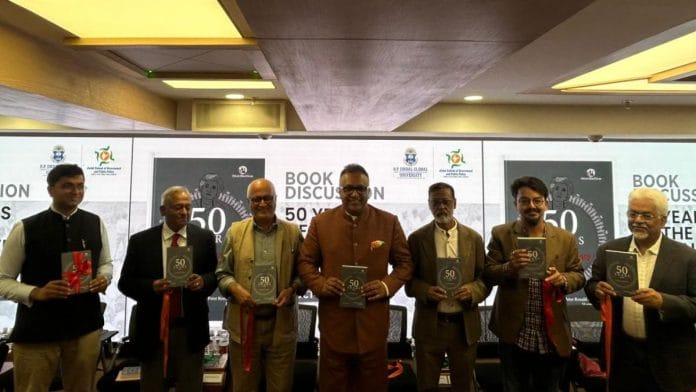New Delhi: The 21-month Emergency imposed by Indira Gandhi in 1975 is widely regarded as a dark chapter in Indian democracy, when fundamental rights were suspended, the press was censored, and thousands were jailed. But five decades on, a unique perspective emerged at the Taj Mahal Hotel in New Delhi—that the ‘dark’ period invariably marked freedom for Dalits.
Last week, at the launch of 50 Years of the Indian Emergency: Lessons for Democracy, edited by Peter Ronald deSouza and Harsh Sethi with contributions from 17 authors, a group of panelists led by deSouza discussed various arguments made in the book. But one chapter, titled “Debating the Idea of Freedom (In the context of 25 June 1975)” by Gopal Guru, drew special focus.
Guru, a political scientist and former professor of politics at Jawaharlal Nehru University (JNU), writes: “The imposition of an Internal Emergency brings to bear on the political sensibility of the Dalit, the truth of the state as the premise of freedom.”
“It was a dark period, but this was another way of looking at the period,” deSouza said.
He read out a portion from the chapter to emphasise his point: “An emergency that becomes a period of liberation because the people who have been oppressing the subaltern classes like moneylenders, those who put them in debt, those who denied them food provisions, people who took all their utensils and gold and kept them in hock, all these people were either threatened or in jail.”
Arup K Chatterjee, professor of English literature at Jindal University who was on the panel, described this oppression-free period as “positive freedom” for Dalits.
“Emergency gave Dalits the capacity to participate in public spaces. It was a kind of social and cultural assertion also for them,” he said.
Other panelists included journalist Bharat Bhushan, professor and Dean of the Jindal School of Journalism and Communication, OP Jindal Global University Kishalay Bhattacharjee, professor of history at OP Jindal Global University Gitanjali Surendran, and sociologist-lawyer Kalpana Kannabiran.
Also read: Meghnad Desai’s last book brings Gandhi and Jinnah in one frame. ‘It’s the story of India’
Then and now
Another chapter that the discussion focused on was professor R Sudarshan’s essay “Aftermath of the Internal Emergency (The More Things Change, the More They Remain the Same).
There was a consensus among the panelists that things indeed have changed in the past fifty years, but they have changed for the worse.
“I would like to qualify the last phrase, Sudarshan, and say that things have not remained the same. The more they have changed, the worse they have become in the case of India,” Bhushan said, addressing the author in the audience after citing a passage from his chapter.
In 2024, the Narendra Modi government decided to observe 25 June as Samvidhaan Hatya Diwas (Constitution Murder Day) every year. During the discussion on the book, the speakers drew parallels between Emergency and the current political situation in the country.
Bhusan raised the arrest of NewsClick editor-in-chief Prabir Purkayastha under the Unlawful Activities (Prevention) Act in October 2023.
“There was no grounds like Emergency, no written grounds of arrest were provided to him,” Bhushan said, also citing the arrests of activists Umar Khalid, Sharjeel Imam and Gulfisha Fatima to support his argument.
Bhushan said former prime minister Indira Gandhi’s assertion of foreign powers conspiring against her to destabilise her power could be witnessed now as well and referenced the chapter “Emergency and the Fabled Foreign Hand: A factual, Fanciful and Fabricated fear?” written by Varun Sahni, professor of International Relations, Ashoka University.
“Foreign-funded journalism is anti-national. All this is happening now, not during 1975-77,” he said, listing the farmers’ protest and anti-CAA agitation.
(Edited by Theres Sudeep)






